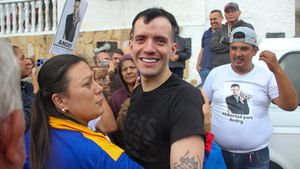Over the weekend, Pope Francis told an audience of more than 7,000 that the Christian family and marriage "have never before been under attack like today."
Indeed, the Catholic News Agency's report used "Gay Marriage" as one of its tags, and its headline-- "What Is Being Proposed Is Not Marriage' -- sure sounds like an anti-equality talking point.
But media reports on Pope Francis's remarks -- made during a Spanish-language Q&A Saturday at a gathering of the Schoenstatt Apostolic Movement at the Vatican -- suggest that he was focused not on same-sex marriage but on divorce, cohabitation outside of marriage, and a perceived failure of couples to adequately prepare for or commit to marriage.
Here is one of the relevant questions and answers as reported by AsiaNews, which broke down individual questions and answers (none of which mentioned LGBT people specifically) in its report:
Q. How can we help people who do not feel welcome in our church, and engaged couples seeking to a path to the fullness of life in marriage?
A: "The question you have asked is very sad and painful. I think the Christian family, marriage have never before been under attack like today. Directly or indirectly. I may be wrong but I think Church historians will speak about this in years to come, but I think the family is being bastardized as if it were simply an association of people to join at will. In that way anything can be called a family ... there's just a crisis of the family. This is because it is being attacked from all sides, and is being injured. ...
"We could limit ourselves to make a nice speech and some nice sounding statements of principle on this issue. Of course, this should be done. It must be said loudly: 'What you are proposing is not marriage,' it must be said clearly. But first and foremost we need a ministry of help which, in this case, must be 'person to person': accompanying, spending some time with those who have problems. The great master of wasting time was Jesus, who wasted time in accompanying and maturing consciences. Accompany means to walk together. ...
"How can you lead engaged couples to marry after only two courses? You can not! It is a sin of omission on our part, of the priests. Marriage preparation must start from far off. Many do not know what they are doing when they hey get married, without knowing what it means. The conditions that they promise are important: they all say 'yes,' but do they realize that this culture of the provisional -- not only in the family but also in the Church - destroys? We need to recuperate many things that are proper to the family, but we cannot be scandalized by the crisis. ...
"[People] who just live together, who choose 'part-time' cohabitation. ... Here are the new forms, totally destructive and limiting the greatness of marriage. That's why we have so many separations, divorces. ..."
Vatican Radio's coverage emphasized the pope's statements that modern culture is temporary or throwaway but that marriage is forever. The concept of a throwaway culture came up again, Susy Hodges reported, with the pope's comment that "our present-day culture is one that destroys the human bonds that bind us together."
Though the remarks didn't specifically mention LGBT people or same-sex marriage, the pope's comments over the weekend struck a different tone than some of his previous statements about nontraditional families.
Famous for asking "Who am I to judge?" on the issue of gay priests, the pope has taken a more conciliatory approach toward LGBT people than his predecessors. During the recent synod in which bishops discussed topics related to family, the Vatican released a document that said the church should recognize positive "gifts and qualities" of gay people and positive aspects of same-sex relationships. Faced with conservative backlash, the Vatican quickly offered a "clarification" and emphasized that the document was an interim report rather than the final word on the matter. The final report did not include the positive language about gay people and same-sex couples. The pope himself appeared to admonish bishops whose efforts blocked the more affirming language in a sermon positing that "God is not afraid of new things."













































































